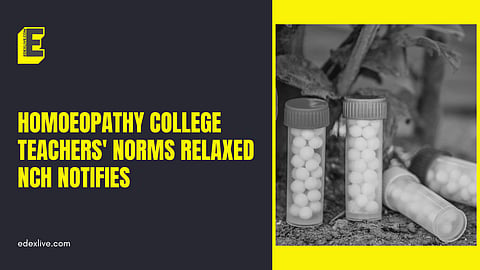

Recently, the National Commission for Homeopathy (NCH) notified changes to the rules governing the MD Homeopathy programme. To recall, NCH has tightened the faculty norms for postgraduate institutions in March 2024. However, these norms have been revised again now.
Last week's changes allowed colleges to have one assistant professor, in addition to an associate professor and a professor, as the minimum faculty for each PG specialisation offered by the institute. The previous norms, which had been in force since March last year, had fixed two associate professors and a professor as the teaching threshold for specialised departments, stated Careers360.
Further, the regulator has also backtracked on the eligibility qualification to be a guide or examiner, once again allowing assistant professors to handle these responsibilities. Under the 2024 rules, only an associate professor or professor could be a guide.
The student-guide ratio for entry-level teachers is 11, as opposed to 2.1 and 3:1 for associate professors and professors — the same as the 1989 rules.
Change in norms
The changes come against the backdrop of a National Medical Commission (NMC) proposal to similarly relax qualification criteria for medical college teachers. The new draft regulations provide for diploma holders and non-teaching consultants and specialists to become faculty members at these institutes.
In medical programmes, the loosening of norms for homoeopathy courses is aimed at increasing the pool of teachers.
Speaking on this matter, Tarkeshwar Jain, NCH President, said, "The colleges are finding it difficult to hire faculty with higher qualifications. When we changed the criteria last year, it was met with resistance, and we received many representations. And hence, it was decided to move back to the earlier practice."
There are 82 homoeopathy colleges around the country with PG centres, with a cumulative intake capacity of more than 2,000. They offer an MD in ten specialisations, namely:
Homoeopathic Materia Medica,
Organon of Medicine and Homoeopathic Philosophy
Homoeopathic Repertory and Case Taking
Homoeopathic Pharmacy
Practice of Medicine
Pediatrics
Psychiatry
Community Medicine
Dermatology and Research Methodology
Biostatistics
